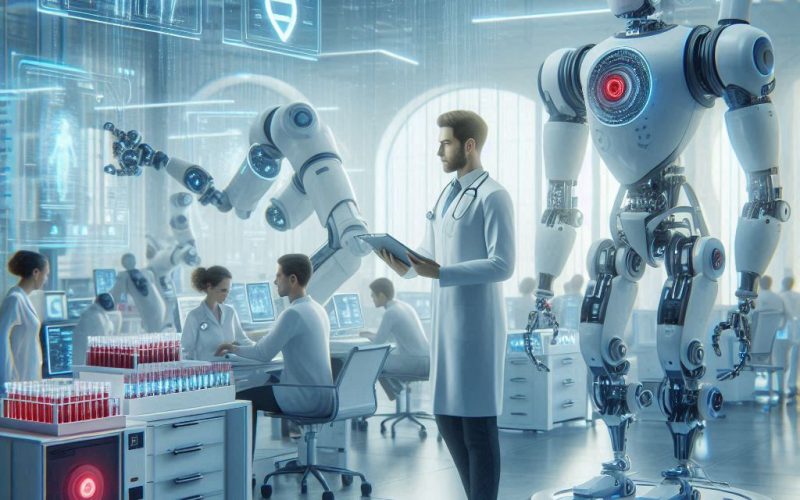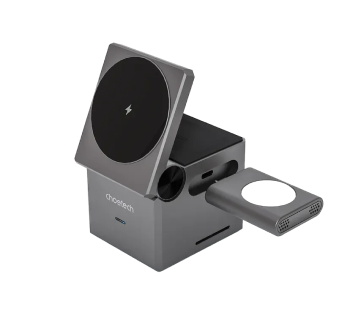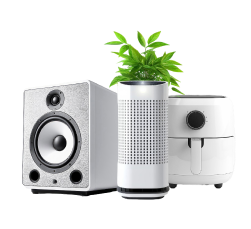Artificial intelligence and robotics have ushered in a new era of innovation, profoundly transforming industries worldwide. In the realm of healthcare, these technologies are revolutionizing the way we diagnose, treat, and care for patients.
Imagine a world where surgeries are performed with unparalleled precision by robotic hands, diseases are detected early through advanced imaging algorithms, and personalized treatment plans are crafted by intelligent systems. This is not science fiction—it is the burgeoning reality of AI and robotics in healthcare.
This article explores the transformative impact of AI-powered robotics in healthcare, delving into their diverse applications, significant benefits, inherent challenges, and promising future trends on the horizon.
For healthcare professionals, these advancements can lead to more accurate diagnostics and minimally invasive surgical procedures. Researchers will find new avenues for innovation and collaboration, while technology enthusiasts can anticipate a surge in cutting-edge developments. Understanding the profound implications of these advancements is crucial for all these groups, as it shapes the future of healthcare.
Table of Contents
Applications of AI Robotics in Healthcare
Surgical Assistance
AI-powered robotic systems have significantly improved the precision and outcomes of surgical procedures. Robotic-assisted surgery allows for minimally invasive techniques, reducing recovery times and minimizing surgical risks. For example, the da Vinci Surgical System enables surgeons to perform complex procedures with enhanced accuracy and control. This system translates the surgeon's hand movements into smaller, precise actions inside the patient's body, resulting in fewer complications and quicker recovery.
Diagnostics and Imaging
AI algorithms excel in analyzing medical images, such as X-rays, MRIs, and CT scans. These algorithms can detect anomalies and patterns that might be missed by the human eye. For instance, Google's DeepMind has developed an AI system capable of diagnosing eye diseases with accuracy comparable to that of leading experts. This capability not only speeds up the diagnostic process but also ensures early detection of diseases, which is crucial for effective treatment.
Patient Monitoring and Care
Robotic systems equipped with AI can monitor patients' vital signs and provide real-time updates to healthcare providers. This continuous monitoring is particularly beneficial for managing chronic conditions such as diabetes and heart disease. AI-driven wearable devices can track parameters like blood sugar levels, heart rate, and physical activity, sending alerts to both patients and doctors in case of irregularities. Such proactive monitoring allows for timely interventions and better disease management.
Rehabilitation and Physical Therapy
AI and robotics are transforming rehabilitation and physical therapy by providing personalized treatment plans and monitoring progress. Robotic exoskeletons, for example, assist patients in regaining mobility after spinal cord injuries or strokes. These devices use AI to adapt to the patient's movements and provide the necessary support for rehabilitation exercises. Virtual reality (VR) combined with AI also offers immersive therapy sessions that motivate patients and enhance their recovery.
Drug Discovery and Development
AI-powered robotics are accelerating the drug discovery and development process by analyzing vast datasets to identify potential drug candidates. This technology reduces the time and cost associated with bringing new drugs to market. For instance, Insilico Medicine uses AI to predict the efficacy of compounds and optimize drug design. By automating repetitive tasks and analyzing complex biological data, AI-driven robots are transforming the pharmaceutical industry.
AI in Pathology
AI-powered robotics are revolutionizing pathology by automating the analysis of tissue samples. AI algorithms can swiftly and accurately identify abnormalities in biopsy samples, aiding pathologists in diagnosing cancers and other diseases. For example, PathAI's platform uses machine learning to provide precise diagnostic information, reducing human error and speeding up the diagnostic process.
Administrative Automation
AI and robotics are streamlining administrative tasks in healthcare, such as patient registration, billing, and appointment scheduling. Robotic process automation (RPA) can handle repetitive administrative functions, freeing up staff to focus on patient care. AI-driven systems can also optimize appointment schedules to reduce wait times and improve patient flow. This automation enhances operational efficiency and patient satisfaction.
Benefits
Having explored the diverse applications of AI robotics in healthcare, it's clear that these technologies are reshaping medical practices in profound ways. Now, let's delve into the numerous benefits that AI and robotics bring to the healthcare sector, highlighting how they enhance precision, efficiency, and patient care.
Improved Accuracy and Precision
One of the most significant benefits of AI and robotics in healthcare is the enhanced accuracy and precision they offer. In surgical procedures, robots can perform tasks with a level of detail and steadiness that surpasses human capabilities. This precision reduces the risk of errors, leading to better patient outcomes and shorter hospital stays.
Increased Efficiency
AI and robotics streamline various healthcare processes, leading to increased efficiency. Automated systems can handle routine tasks such as data entry, patient monitoring, and scheduling, allowing healthcare professionals to focus on more critical aspects of patient care. For example, AI-driven chatbots can handle initial patient inquiries, freeing up time for medical staff. This efficiency translates to reduced waiting times and improved patient satisfaction.
Cost Reduction
The integration of AI and robotics in healthcare can lead to significant cost savings. Minimally invasive robotic surgeries reduce the need for prolonged hospital stays and postoperative care, lowering healthcare costs.
Additionally, AI-driven diagnostics can detect diseases at earlier stages, potentially reducing the expenses associated with advanced treatments. In drug discovery, AI reduces the time and resources required to develop new medications, ultimately decreasing the cost of bringing drugs to market.
Enhanced Patient Experience
AI and robotics enhance the overall patient experience by providing personalized care and improving communication. Wearable devices and mobile apps allow patients to monitor their health and receive real-time feedback. Telemedicine platforms powered by AI enable remote consultations, making healthcare more accessible, especially for those in remote areas. These innovations empower patients to take an active role in their health management, leading to better outcomes and satisfaction.
Advancements in Research
AI and robotics are driving advancements in medical research by enabling the analysis of large datasets and the discovery of new insights. Machine learning algorithms can identify patterns and correlations in complex biological data, leading to breakthroughs in understanding diseases and developing novel treatments. For example, AI has been instrumental in genomic research, helping scientists identify genetic markers associated with various diseases. These advancements accelerate the pace of medical research and pave the way for innovative therapies.
Challenges
High Initial Costs
The implementation of AI and robotic systems in healthcare requires significant upfront investment. The cost of acquiring and maintaining advanced robotic equipment can be prohibitive for smaller healthcare facilities. Additionally, the integration of AI systems often necessitates upgrades to existing infrastructure and training for staff. These initial costs can pose a barrier to widespread adoption, particularly in underfunded healthcare settings.
Data Privacy and Security
The use of AI and robotics in healthcare involves the collection and analysis of vast amounts of sensitive patient data. Ensuring the privacy and security of this data is a major challenge. Cybersecurity threats, such as data breaches and hacking, can compromise patient information and undermine trust in these technologies. Healthcare organizations must implement robust security measures and comply with regulations to protect patient data.
Ethical Concerns
The integration of AI and robotics in healthcare raises ethical questions related to autonomy, consent, and decision-making. For instance, the use of AI in diagnostics and treatment recommendations may limit the role of human judgment and expertise. Ensuring that AI systems are transparent, unbiased, and accountable is essential to address these ethical concerns. Additionally, there is a need for clear guidelines and regulations to govern the use of AI in healthcare.
Technical Limitations
Despite their potential, AI and robotic systems have certain technical limitations. AI algorithms require large amounts of high-quality data to function accurately, and any biases in the data can lead to incorrect predictions or recommendations. Moreover, the complexity of medical procedures and the variability in patient conditions pose challenges for the development of universally applicable AI solutions. Continuous research and development are necessary to overcome these technical limitations and improve the reliability of AI and robotics in healthcare.
Resistance to Change
The adoption of AI and robotics in healthcare often encounters resistance from healthcare professionals and patients. Some healthcare providers may be hesitant to rely on AI-driven systems, fearing job displacement or questioning the accuracy of these technologies. Patients may also be wary of robotic interventions and prefer traditional methods of care. Addressing these concerns through education, training, and demonstrating the benefits of AI and robotics is crucial for their acceptance.
Future Trends and Innovations
Personalized Medicine
The future of AI and robotics in healthcare is closely tied to the concept of personalized medicine. AI algorithms can analyze genetic, environmental, and lifestyle data to develop individualized treatment plans. For example, AI-driven platforms can predict how patients will respond to different medications, allowing for tailored drug therapies. This approach not only improves treatment efficacy but also minimizes adverse effects.
Integration with the Internet of Medical Things (IoMT)
The Internet of Medical Things (IoMT) refers to the network of connected devices that collect and transmit health data. The integration of AI with IoMT will enhance remote monitoring and telemedicine capabilities. Wearable devices, smart implants, and connected home health devices can continuously collect patient data and transmit it to AI systems for analysis. This real-time data exchange enables proactive healthcare interventions and personalized treatment plans.
AI-Driven Predictive Analytics
Predictive analytics powered by AI will play a significant role in future healthcare. AI algorithms can analyze historical patient data to predict disease outbreaks, patient deterioration, and treatment outcomes. For instance, AI can forecast which patients are at risk of developing complications after surgery, allowing for early interventions. These predictive capabilities will enhance clinical decision-making and improve patient outcomes.
Advanced Robotics for Surgery
The future of robotic surgery holds exciting possibilities. Researchers are developing next-generation robotic systems with enhanced dexterity, sensory feedback, and AI-driven decision support. These systems will enable more complex procedures to be performed with greater precision and minimal invasiveness. Additionally, the use of augmented reality (AR) and virtual reality in robotic surgery will provide surgeons with real-time visualizations and guidance during procedures.
AI in Mental Health
AI has the potential to transform mental health care by providing personalized support and early intervention. AI-driven chatbots and virtual therapists can offer immediate assistance and monitor patients' mental health. For example, Woebot is an AI-powered chatbot that provides cognitive-behavioral therapy (CBT) to users, helping them manage anxiety and depression. These AI solutions complement traditional therapy and make mental health support more accessible.
Conclusion
The integration of AI and robotics in healthcare is transforming the industry, offering unprecedented opportunities for improving patient outcomes, increasing efficiency, and advancing medical research. From surgical assistance to personalized medicine, AI and robotics are revolutionizing how healthcare is delivered.
However, challenges such as high initial costs, data privacy concerns, and ethical considerations must be addressed to fully realize the potential of these technologies. As AI and robotics continue to evolve, their role in healthcare will only become more significant, paving the way for innovative treatments and better patient care.
Healthcare professionals, administrators, and researchers must stay informed about the latest developments in AI and robotics to harness their full potential. By embracing these technologies and addressing the associated challenges, the healthcare industry can move towards a future where AI and robotics play a central role in delivering high-quality, personalized care.



